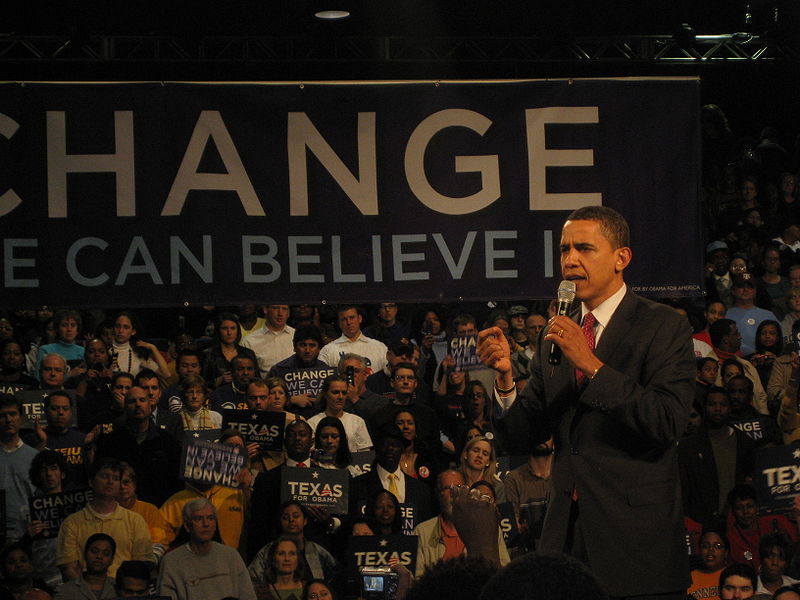The More Things Stay the Same, the More Things Change
 It’s been clear for months, and now the nation has an election to verify it: This country is not the America the founding fathers envisioned. The founding father’s envisioned a country where property owning white men decided the future of this nation. No more.
It’s been clear for months, and now the nation has an election to verify it: This country is not the America the founding fathers envisioned. The founding father’s envisioned a country where property owning white men decided the future of this nation. No more.
I don’t have the numbers in front of me, but Romney won the demographic by over 20 points this year, expanding John McCain’s win in 2008. Ten years ago, this might’ve been a landslide.
Running through the numbers on demographics: Whites and men broke for Romney, women went for Obama 55 to 44 percent, Hispanics 72 to 27 percent, and young people by a massive margin as well. Whites represented a smaller portion of the electoral vote, while Hispanics and young people took up larger fractions than ever before. Look up the demographics yourself for exact numbers, but the point is, the GOP proved this election they are the party of old, white, men. And that’s no longer America.
From an historical perspective, the election will be remembered as a fascinating, and perhaps most obvious shift in demographics. In 2050, when Americans are even more diverse than they are today, it will be the 2012 election that marked the pivot point. This was when demographics changed.
And while some may say the result proves the country is veering away from its traditional values, the truth is, this is the closest we’ve come yet to the American way. No one group can dominate our system anymore. Truly, it was a coalition of minorities that propelled this president to victory. That is uniquely American. No other country in the world has elections like this.
The implications for Republicans (as written about by my foil Jamie Boothe) are clear. They better shape up, or they’re irrelevant. Clearly, the party will opt for the former, but it will be very interesting to see the civil war that ensues over the next four years. One thing I will wager on: Marco Rubio will be on the ticket in 2016.
Now for a little retrospective analysis, because there are some important issues that have to be cleared up. Pennsylvania and Minnesota were the Romney campaign’s last gasp, not powerplay. Hurricane Sandy did not determine the race. Romney’s polling momentum had stalled before the hurricane even hit. Which brings up another point: Polls are actually good at predicting results. They aren’t biased towards Democrats. Oh, and Nate Silver is definitely a witch.
Stepping away from demographics, there are several other noteworthy elements in this election. One, this was the Republicans’ to lose in every way. The Senate was vulnerable. The president was a clear underdog, presiding over a weak economy and passing some of the most unpopular legislation in years. Plus, the country had shown its disdain for Democrats in 2010. While healthcare gained a bit of popularity following the Supreme Court’s ruling and the economy noticeably improved throughout the campaign, he was one of the weakest incumbents in recent memory.
What that meant is a lot of Independents who supported him four years ago didn’t like him all that much anymore, a lot of Democrats were disenchanted, and a lot of Republicans were mad.
What isn’t talked about a lot is that Obama lost the Independents this cycle, and he lost the Republicans (obviously). He won Democrats. And that was enough.
It was enough because he had the best groundgame this country has ever seen. They say a good "Get Out the Vote" effort can sway the election a few points either way. Those are the margins the President is winning swing states.
Republicans were counting on Obama losing his luster from four years ago. They were counting on decreased turnout. Well young people turned out even more, as did Hispanics (as I’ve mentioned). Republicans have never been as strong with their groundgame (despite Romney’s substantial gains this cycle). After witnessing the immense power of the Obama grassroots machine, Republicans must reconsider how they want to conduct campaigns. Perhaps less fundraisers, more volunteers?
But what’s the fallout of the election? We know Republicans have some soul-searching to do, but what happens with Washington? The House is still red. The Senate and White House blue.
To flip a famous quote, “The more things stay the same, the more things change.”
Both sides are gonna have a chance to really get to know each other (icecream social anyone?) because the American people decided they like everyone just where they are. The American people decided that Washington’s gonna have to figure this one out. A little bit of tough love.
I have a feeling it’s going to work out. It’s not totally rational. Maybe I’ve been spending too much time in the Obama echo chamber. But I am confident this president learned from his mistakes. He won’t repeat the 2011 summer debt ceiling negotiations again. He can’t afford to and he doesn’t want to. This term will be different, a balancing act.
